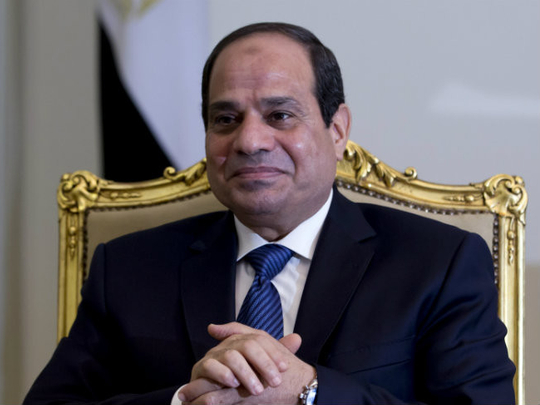
For those looking at the situation in Egypt from outside, things might look changing in the right direction — especially on the economic side. Reports by international institutions, like International Monetary Fund, commend the leadership for the drastic and socially-painful measures taken to put the economy on the right path. Macroeconomic indicators are improving, and the prescription for such institutions are being followed to a great extent. Yet, visiting Egypt and experiencing the socioeconomic status may lead to a somewhat different conclusion. Policies adopted by President Abdul Fattah Al Sissi are welcomed by most if not all, though they have truly improved the books of the economy in a much-needed way to embark on the long road to development. Popular mandate for Al Sissi, who was elected President in June 2014, was actually based on broader legitimacy that goes far beyond a presidential election win. It was established a year before, in July 2013, when he — as the head of the army at the time — heeded the popular call to oust Ikhwan [Muslim Brotherhood] from power. Capitalising on that mandate to reform the economy was right, but some — even among the current administration in Egypt — worry about the details of that reform.
Judging by gross domestic product (GDP) growth, Egyptian economy suffered seriously with the turmoil of 2011 dropping to just over 1 per cent from closer to 6 per cent the year before. It stayed dwindling till 2013 with around 2 per cent growth. Now, Egypt’s GDP is around 4 per cent and expected to grow steadily, with structural faults of the last four decades being tackled. At the turn of the century, GDP growth was around 1 per cent. A new economic team within the Cabinet managed to push the growth to over 7 per cent in 2008. At the time, it was estimated that Egypt needed a sustained GDP growth of over 7 per cent to overcome its economic problems. That didn’t happen and the situation took disastrous proportions with the 2011 turmoil and thereafter. Now, the government needs to push growth to more than double the current rate to be able to adjust the books and absorb the flaring problems like unemployment, inflation, and similar indicator that have socio-political impact.
It’s true that structural defects in Egyptian economy go back many decades, and that a parallel economy grew in a cancerous way to transcend the official one. But curbing this and surgically treating the chronic economic ills come with a dear cost for the government. Al Sissi and his government are keen to do this at any cost. Yet, the prescriptions available lack innovation — for fear of socio-political backlash. Whether the current approach can succeed in establishing a launch-pad for development is still uncertain. Egyptians are used to complaining about economic hardships and lack of opportunity for social mobility, but what you hear now is different. Even the upper crust of the middle class can no longer afford scrapping of subsidies on fuel, water and electricity.
The government had embarked on huge infrastructure and construction projects. Those were needed for development and were long overdue. But even those who benefit from these ‘achievements’ still talk about hardships and talk about food prices, utility bills and cost of education. It may be true that painful reform measures come without a proper social safety-net for those affected badly. With a drop in revenues like expat remittances, tourism, Suez Canal transport and the likes, the government has to borrow to finance its reform programme. Also, the threat of terrorism is eating into the general budget with huge allocations for security. As resources are limited, prioritising financial reform rather than a broader economic reform may not serve the purpose. Current reforms may be good ‘by the book’ — as used by IMF and other similar institutions — but they are not the best for ordinary people. It’s true that Egyptians heeded the call of their president that “Times are tough, and we need to go through it together”. But you can’t bank on that endurance for long.
There’s a presidential election in Egypt next year, and the people expect the president to show them that things are getting better and his economic programme is working to get their votes for a second term in office. Former president Hosni Mubarak, had, for three decades, provided ‘popular bribes’ for re-election in the form of salary increases or financial support to those without income. Resorting to similar measures now will be like ‘patching up the patches’ and will make the road to development more bumpy. People need to be convinced that this is the right path to improvement, even if they have to suffer for some more time.
Dr Ahmad Mustafa is an Abu Dhabi-based journalist.









